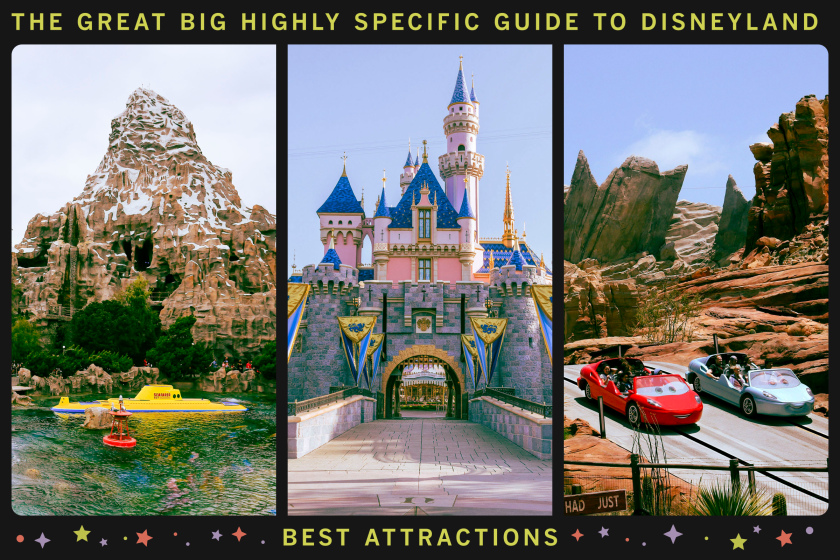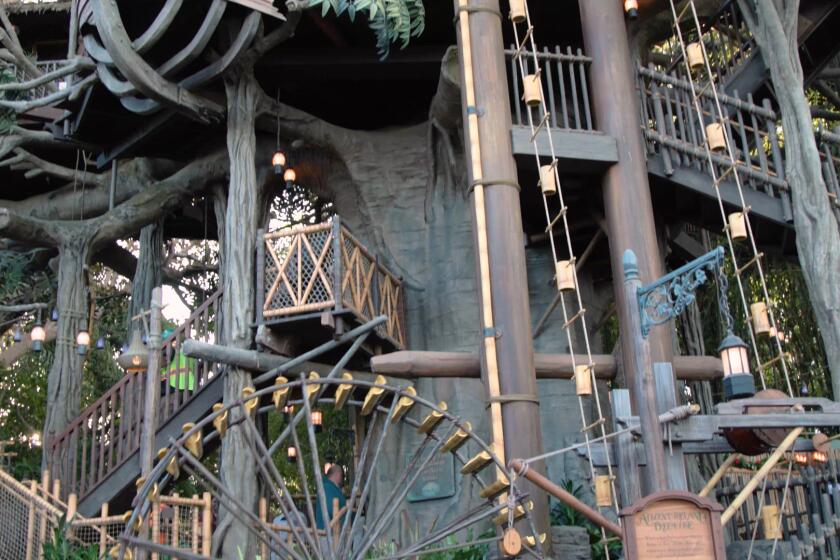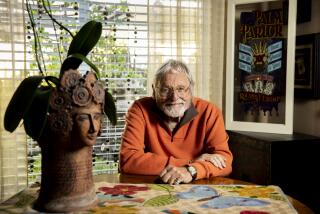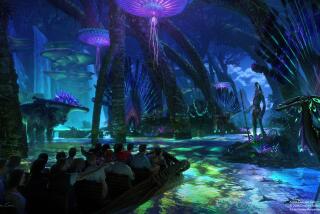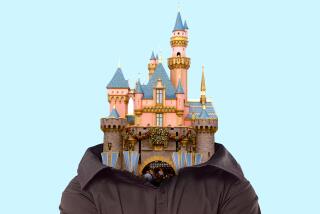The castle is immaculate, its gold etching regal and its towers a bold shade of sky blue. The band at its gates plays no real instruments, but the musicians look dapper and at the ready. Before it all sits an elongated train station, a mix of Victorian grandeur and small-town affability. Look in the distance — there’s a Southern-style mansion, multiple distinct mountains and even another castle, this one nestled at the top of a mound, its spires peering over a wall.
All of it is familiar. It’s Disneyland, mostly.
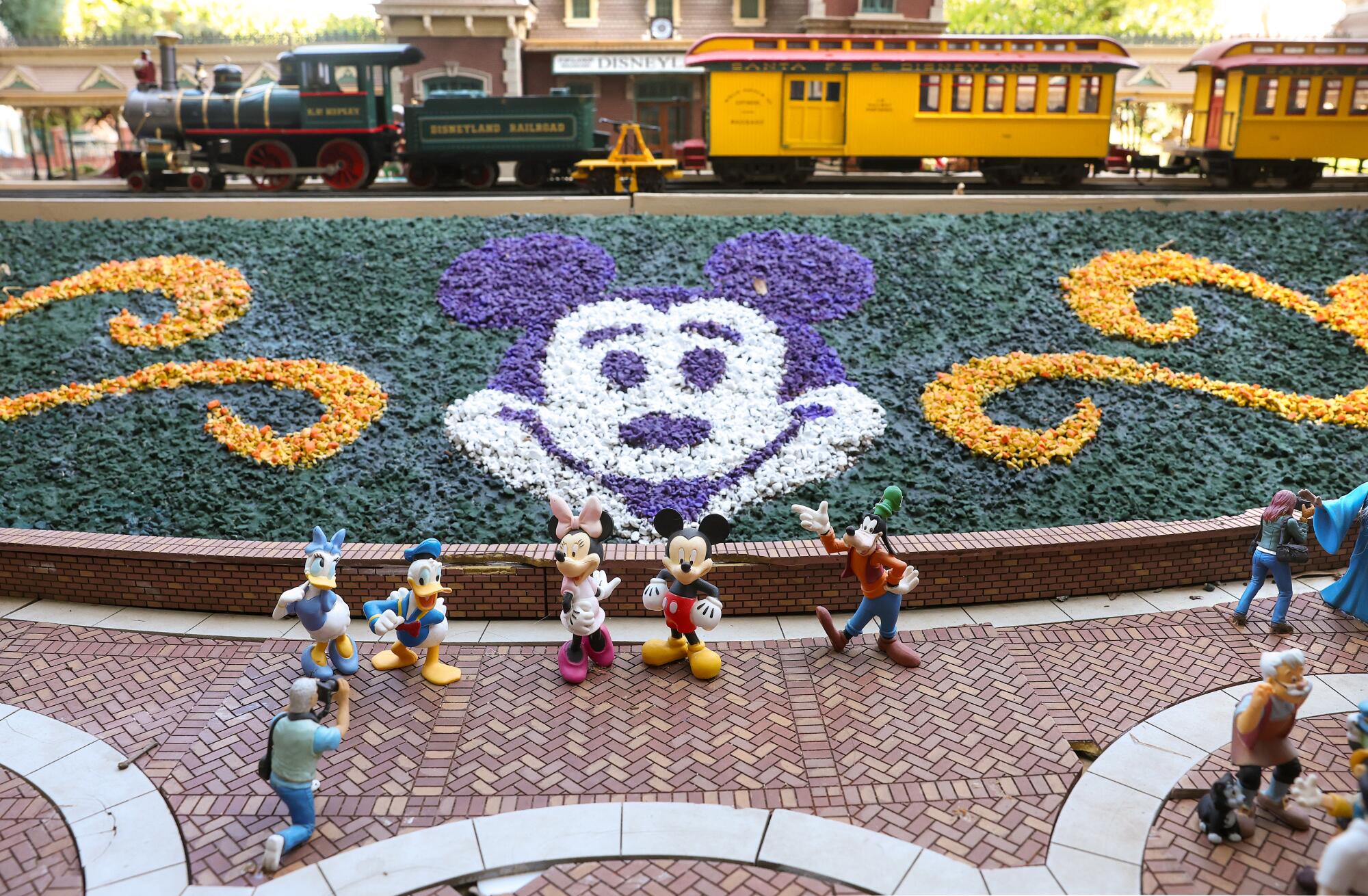
But the setting, the backyard of a modest suburban home in Anaheim Hills, makes it clear this is no official product of the Walt Disney Co. Yet fans flock to it, with free tickets for the rare open house disappearing often in minutes. Welcome to Castle Peak and Thunder Railroad, as David Sheegog calls his backyard garden, home to a miniature love letter to Disneyland and Disney animation. Creating this scaled-down universe has been a passion of his for about a quarter of a century now.
Over the decades, Castle Peak has garnered the attention of local media, become a social media darling and grown with the Sheegog family, as what once was meant to be a gift for his children has taken on a life of its own. The kids have left home, but Castle Peak continues to flourish.
Ranking the rides and attractions at Disneyland and California Adventure from best to worst is hard — but not impossible. Here is the ultimate Disneyland ride ranking.
As Sheegog, an independent architect, looks forward to retirement — he turned 65 last year but is still in practice — he speaks of Castle Peak as if it’s just getting started. Walk with Sheegog to the family garage and find not just storage but a workshop, currently home to a model for a “Star Wars”-inspired entryway that Sheegog hopes will someday lead to a new section of his backyard garden, this one inspired by Disneyland’s Star Wars: Galaxy’s Edge.
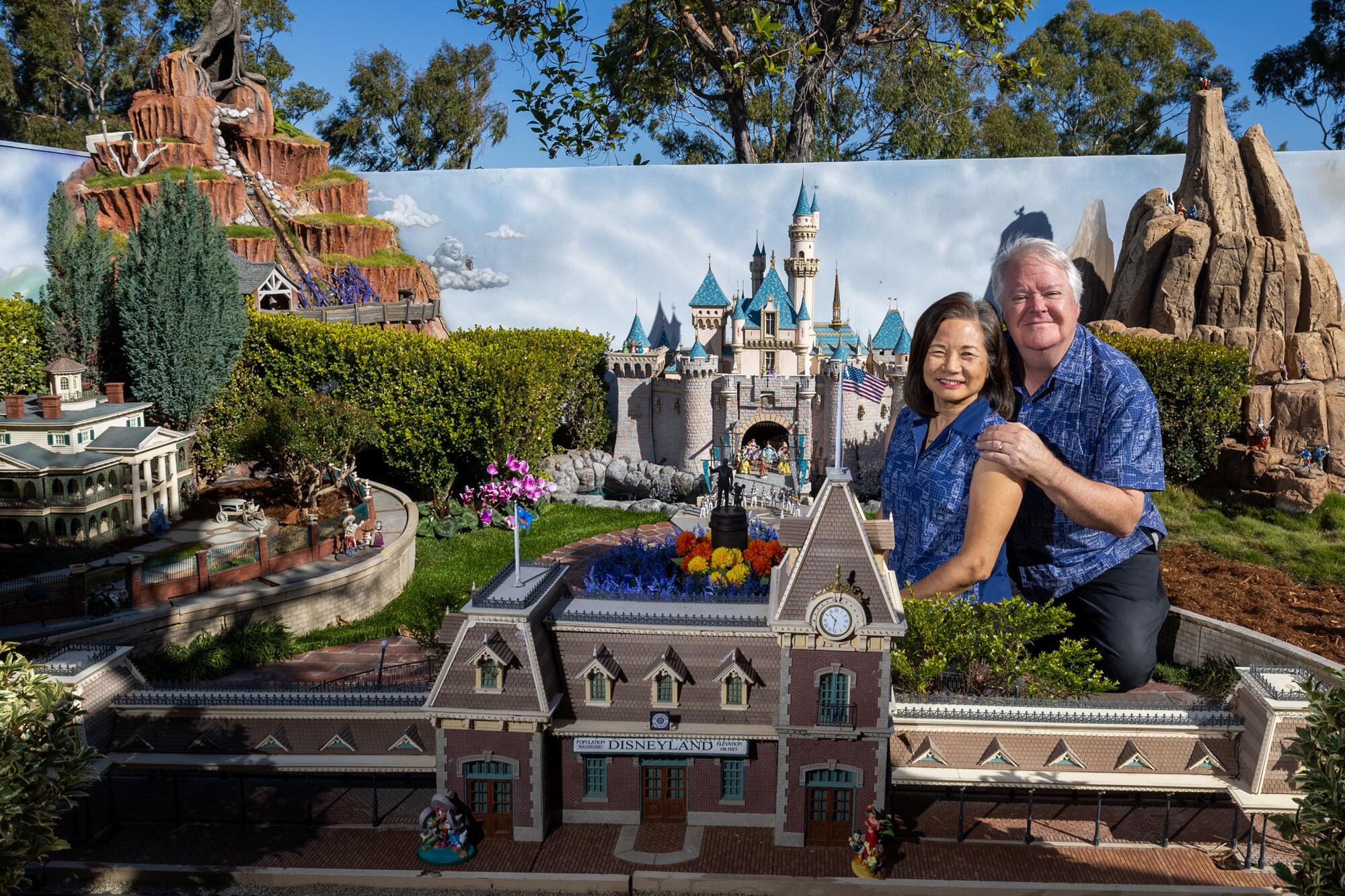
This is no mere modest hobby. That’s apparent not just in the details but in the way Sheegog today thinks of entertaining guests, who are welcomed each spring and fall.
There are small but irresistible touches. Sheegog’s version of the Casey Jr. Circus Train is equipped, for instance, with its own sound module, playing the locomotive’s theme song as it chugs across a bridge. But over the years, Sheegog has embraced his showman side. A recent addition to the patio is what Sheegog calls the “enchanted tiki waterbar,” where a glass window erupts into a thunder and lightning show, complete with a mini-rain storm created by a pump and reservoir.
While the actual Disneyland Resort is just a few minutes from the Sheegog home, Castle Peak speaks to the way the theme park can become a sort of communal hub that can touch multiple generations and stand as something for which people can connect around. For many in Southern California, Disneyland sits somewhere between a landmark and a rite of passage, a place of familial and friendship rituals that stays with you long after the grand finale of the evening’s fireworks.
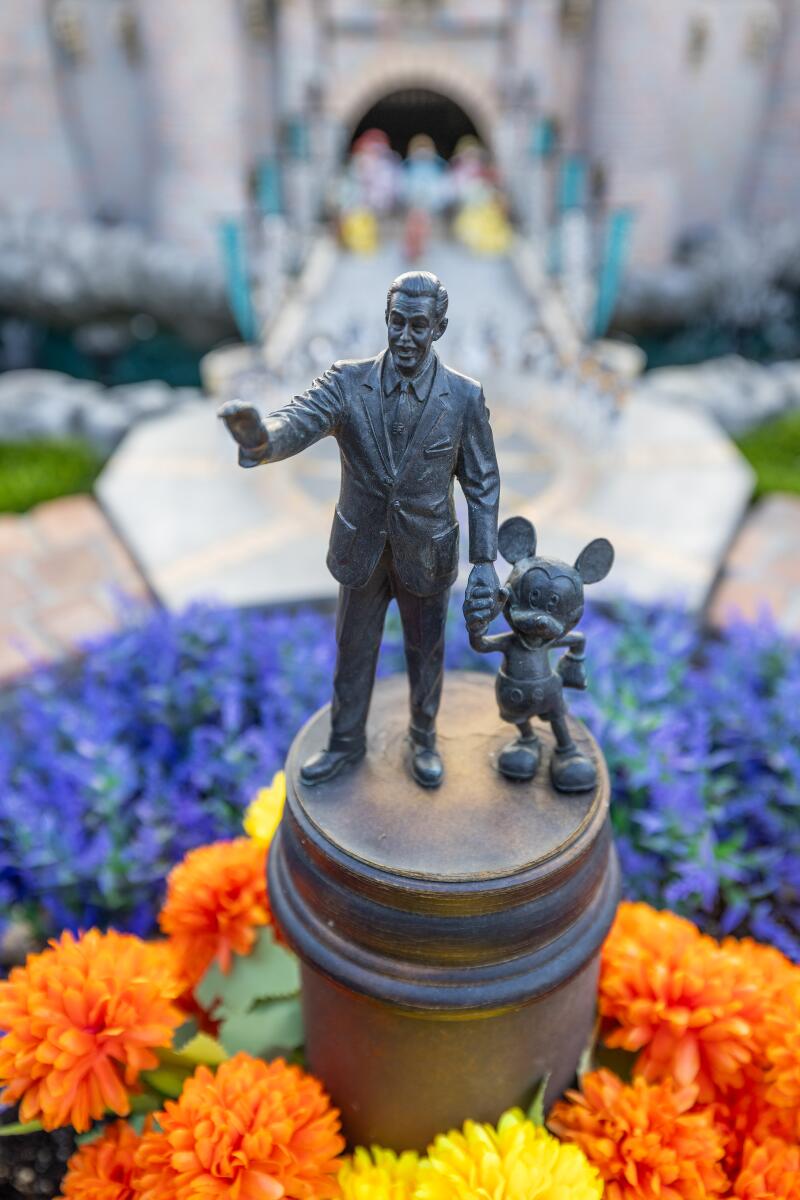
The Sheegogs’ much smaller version of the iconic statue of Walt Disney and Mickey Mouse, whose real-life counterpart graces the entrance to the magic castle at Disneyland.
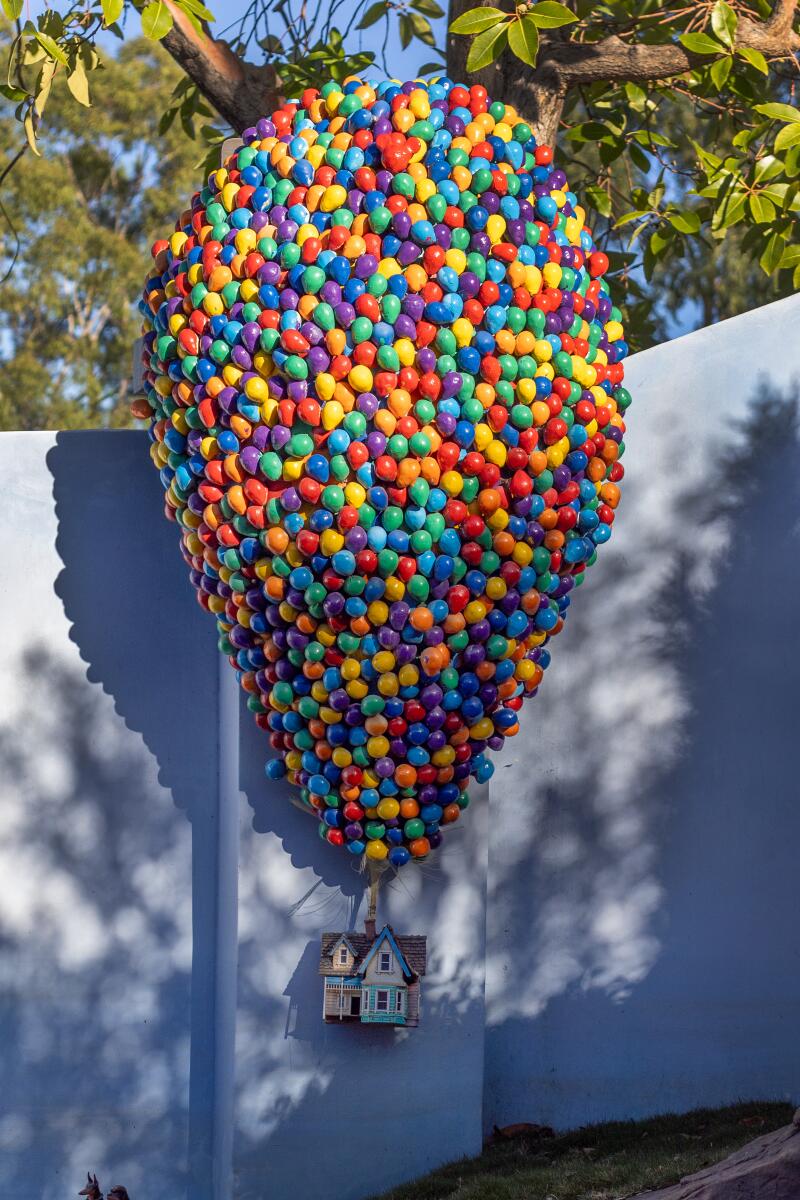
A miniature model of the floating balloon house from “Up.” (Allen J. Schaben / Los Angeles Times)
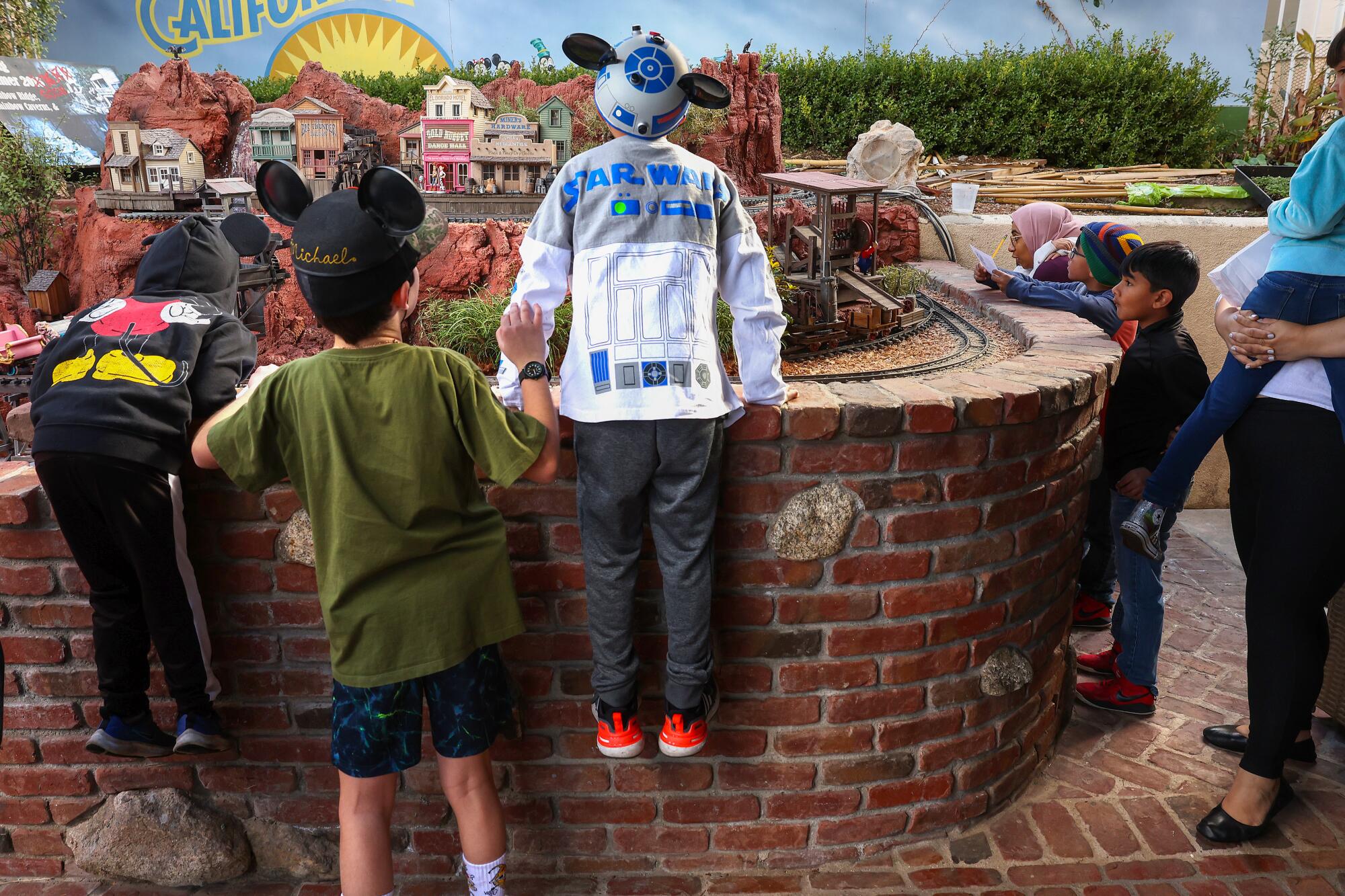
Sheegog believes that’s one reason why his backyard, also home to a 105-year-old Chinese elm bonsai, can barely meet its demand.
“There was a woman here one time, and she was close to 100,” Sheegog says. “She worked in the park on opening day, when Walt Disney was there, and worked in the park her whole life. She had a whole crowd around her, just listening to stories about what it was like. She started weeping. As she was talking, she was reliving her life when she was 20 years old, her first love, where she met her husband. All these memories come back, and a lot of people who come here are that way because we’re in Anaheim. We grew up with the park, and it has a certain sentimental niche in your psyche. People just want to be around it, and our place provides an outlet for that.”
Sheegog kind of stumbled into model railroading. About 25 years ago he was perusing for a gift for a young nephew, now in his 30s, who was a fan of “Thomas the Tank Engine.” Shopping for the latter at a local railroad store, the Orange County native who grew up within walking distance to Disneyland was suddenly hooked by the model railroad industry. Things quickly spiraled.
“This was back in 1997 or so, and I said, ‘This will be a 10-year project.’ As I developed the model — I built a model on our dining room table — we had to decide on the major structures,” Sheegog says. “Most of the garden railroads I had seen people had bought pre-made kits of little plastic buildings that are all about 12 inches by 8 inches. They look like premade little buildings, like a barber shop. No. I wanted to build this from scratch, and wanted them to be impressive, like 5 feet across and 4 feet tall. Or in the case of one our castles, 7 feet tall. I had to plan these out as to where the major buildings would be.”
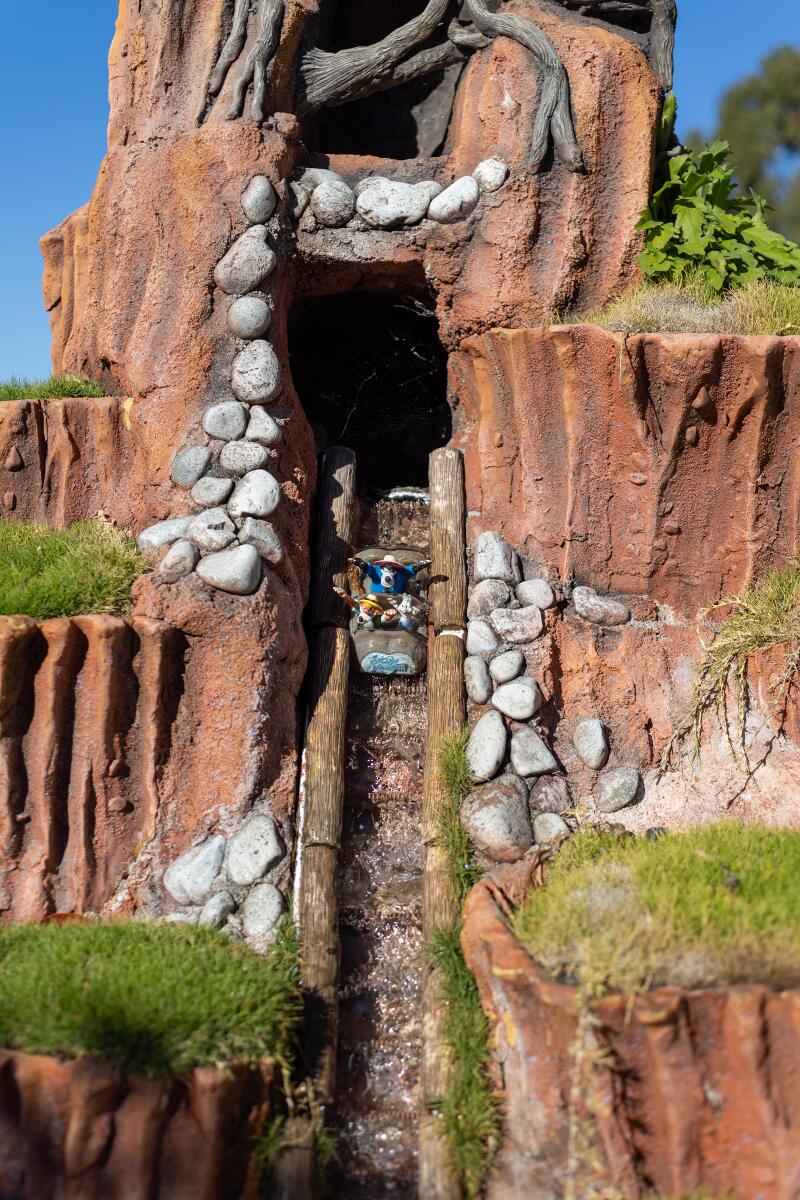
Mini-riders descend down the slope of a shrunken-down Splash Mountain.
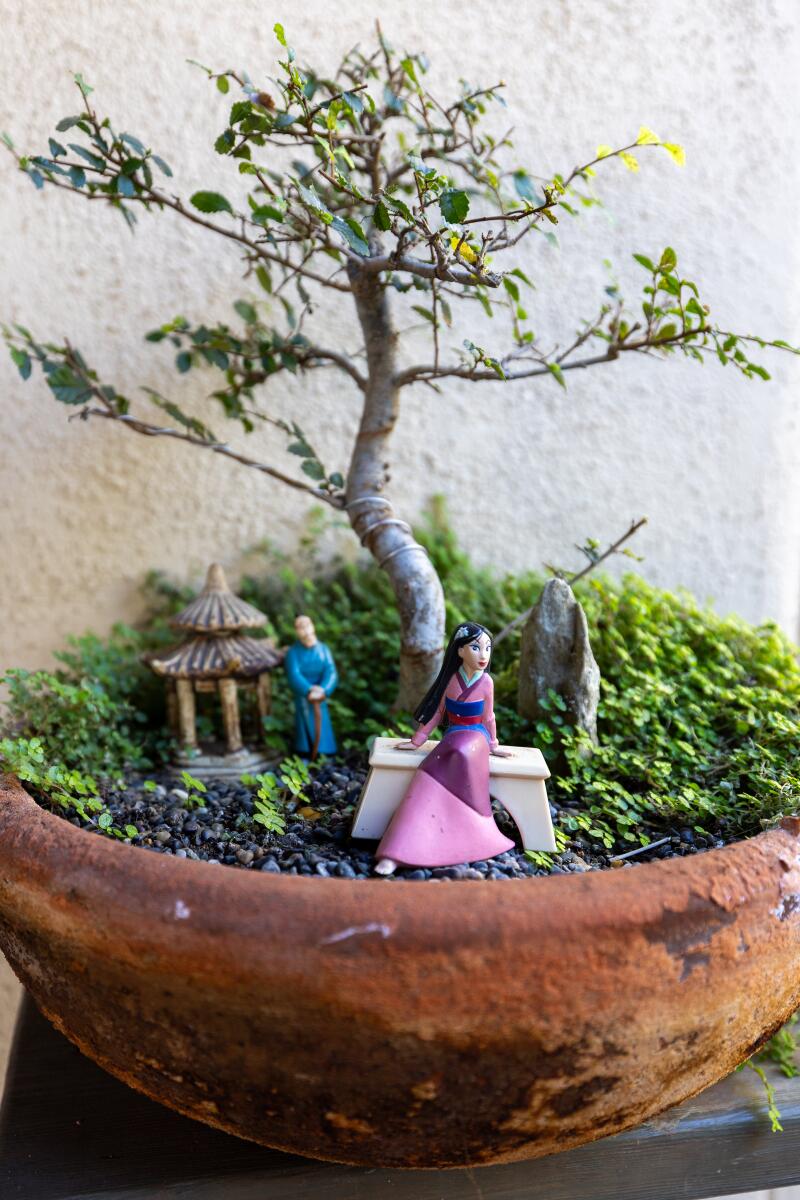
An homage to Mulan in a small potted plant. (Allen J. Schaben / Los Angeles Times)
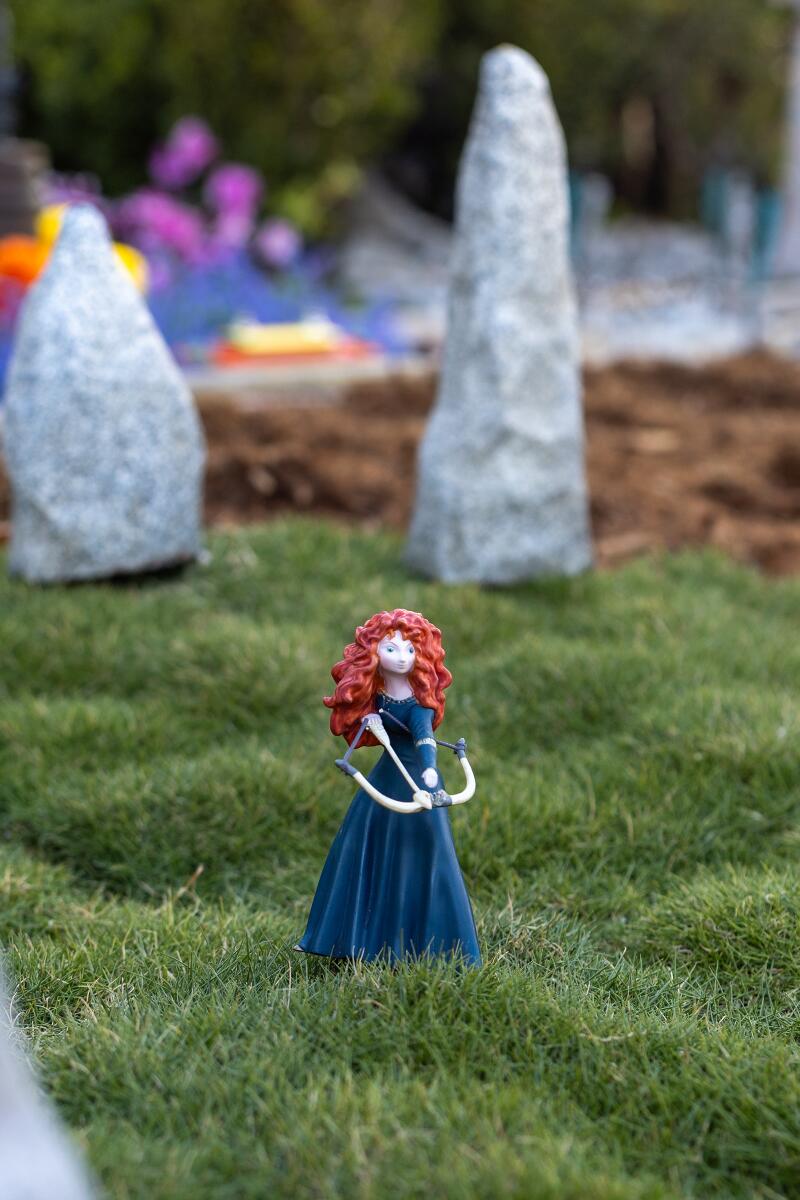
A mini-Merida stands proudly within a circle of rocks.
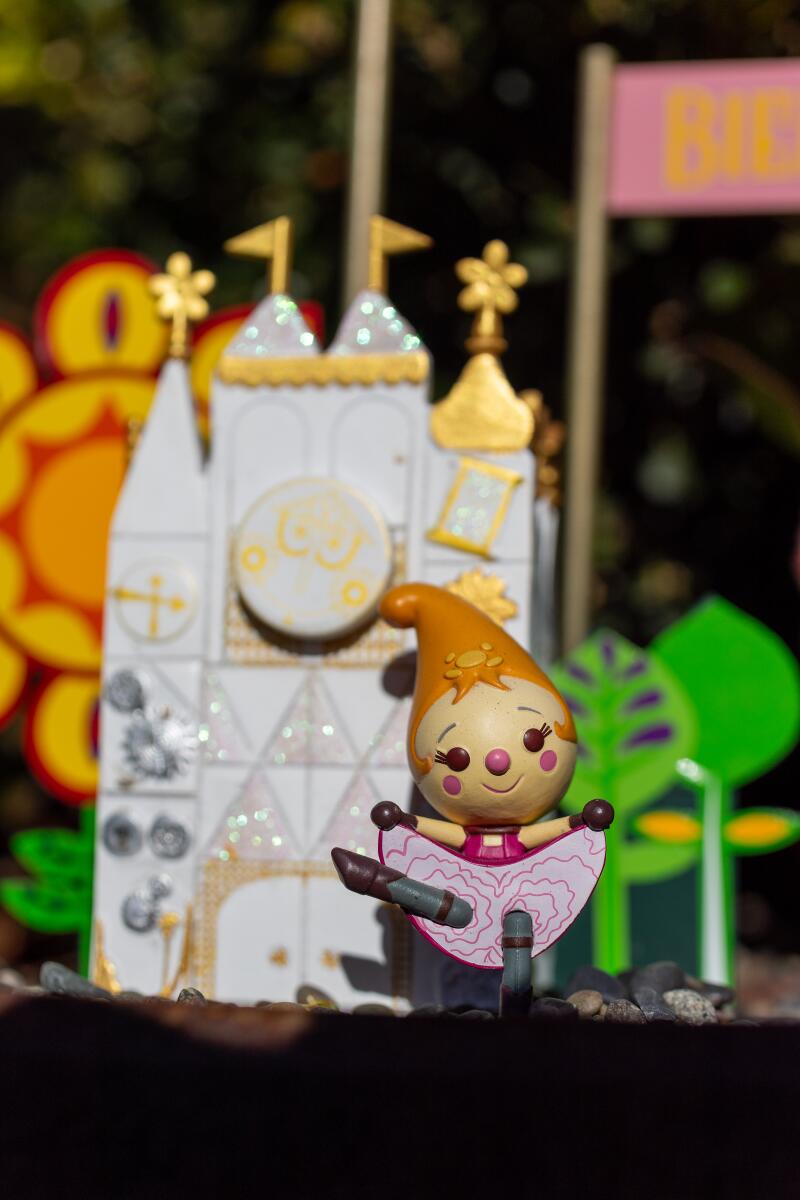
References to Disneyland’s It’s a Small World ride are nestled in small pots around the Sheegogs’ attraction.
At the time, he was thinking of set pieces that would look akin to mini-golf buildings. Sheegog once worked at Disneyland on the Davy Crockett’s Explorer Canoes, and the family’s eldest daughter is named Ariel after “The Little Mermaid.” Thus, Disneyland was a natural theme for the family to explore for the backyard garden. And the Walt Disney Co., of course, has a romanticized history with railroads, as Walt Disney once had a backyard railway of his own and is said to have dreamed up Mickey Mouse on a cross-country train trip.
A Disney-inspired backyard is not, necessarily, an anomaly in American suburbia. HGTV once ran a show dedicated to the practice, and in the early days of the pandemic it became a social media trend to re-create Disney rides at home, with fans experimenting with rudimentary special effects and bringing pets into the action. Some have even built makeshift roller coasters in the yards.
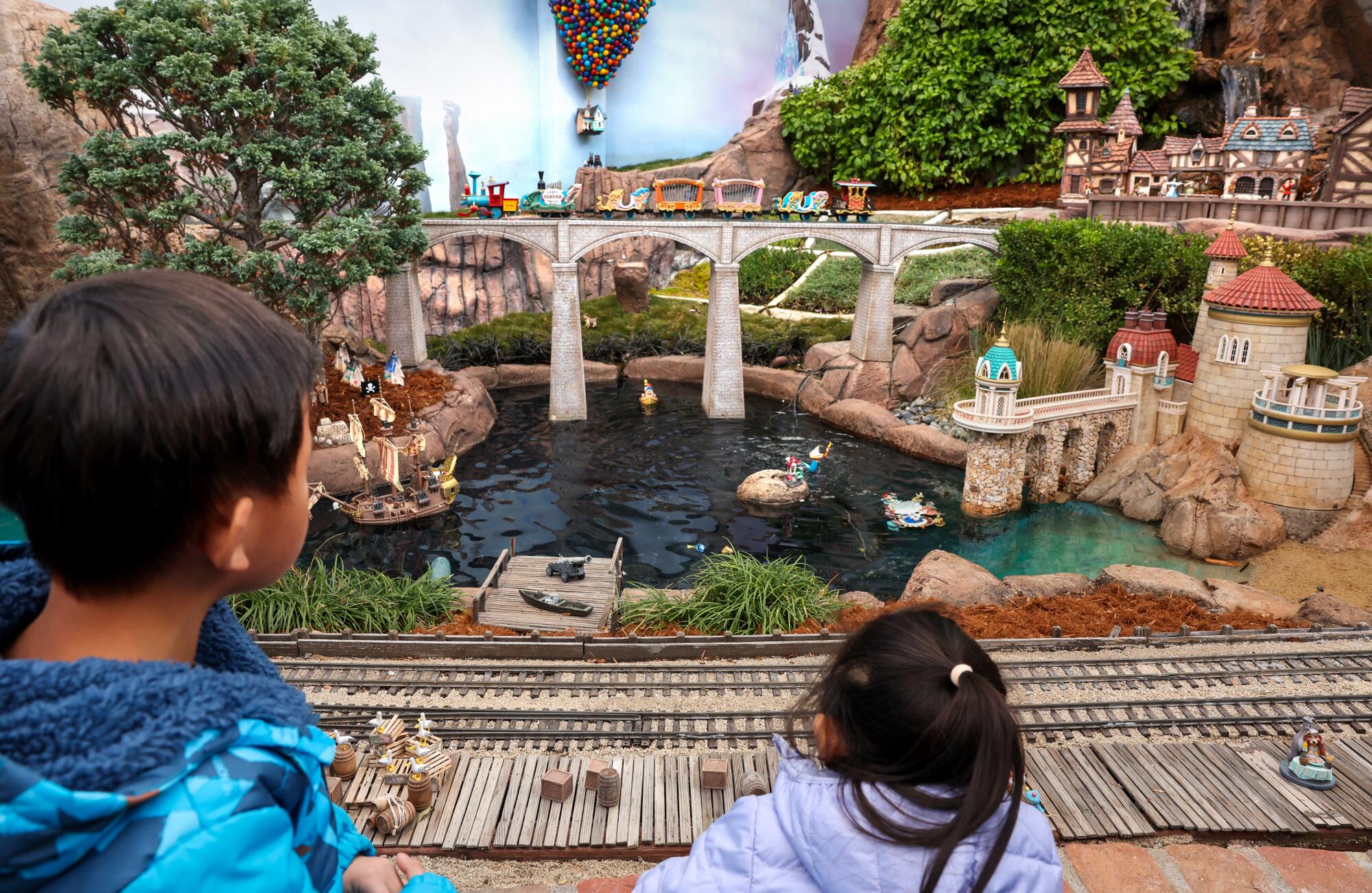
And today, there are host of businesses that attempt to tap the Disney fanbase. One can find elaborately themed homes for rent, as well as pop-up bars such as Montclair’s the Set, which rotates among Disney motifs throughout the year.
Sheegog’s creation has both a professional sheen and a do-it-yourself quality. It’s important to note that it will always be free, as the family doesn’t want to attract the attention of corporate lawyers — timed reservations are required solely to make sure the home and neighborhood aren’t overrun. Aside from Sheegog’s heavily detailed, multiple foot structures — he’s re-created references to the now-defunct Splash Mountain and Disney/Pixar films such as “Up” — he’s also peppered in hidden nods to most every Disney or Pixar animated film from 1937 (“Snow White and the Seven Dwarfs”) to 2021 (“Encanto”).
The recently reopened Adventureland Treehouse Inspired by Walt Disney’s Swiss Family Robinson places its focus on old-fashioned theme park trickery.
“That will be the last one,” Sheegog says of “Encanto.” “I’ve finally put a cap on it. I’ve got 80 films out there. It’s a bunch. I’m running out of room. If they keep coming out, I can’t keep doing something. All my energy is going into other projects with the railroad.”
When Sheegog builds a structure, it’s no simple feat. Occasionally, he says, he’ll get inquiries from guests on the cost of hiring Sheegog to build, say, a Sleeping Beauty Castle. “They think you can do it for $300 or $400, and I say, ‘It’s probably going to be about $70,000 to build that thing again,” he says. “It takes someone six months of their life to build that.”
Money isn’t a topic Sheegog likes to discuss — “We are not wealthy people here, and I’m trying to figure out a way to retire because there’s not a way to do it right now” — and he’s quick to add that the castle didn’t cost him tens of thousands; he’s simply factoring in labor costs. He estimates that over the last two decades he’s sunk what would be the equivalent of buying a pool into his backyard Disneyland.
The investment shows. His initial Sleeping Beauty Castle was built utilizing plywood, PVC, wood turnings and cast resin veneer, but he has since updated the structure with largely polyurethane foam boards and 3D-printed materials. There are detailed galleries on his website documenting the builds of a number of structures, including Rapunzel’s tower and Beast’s castle.
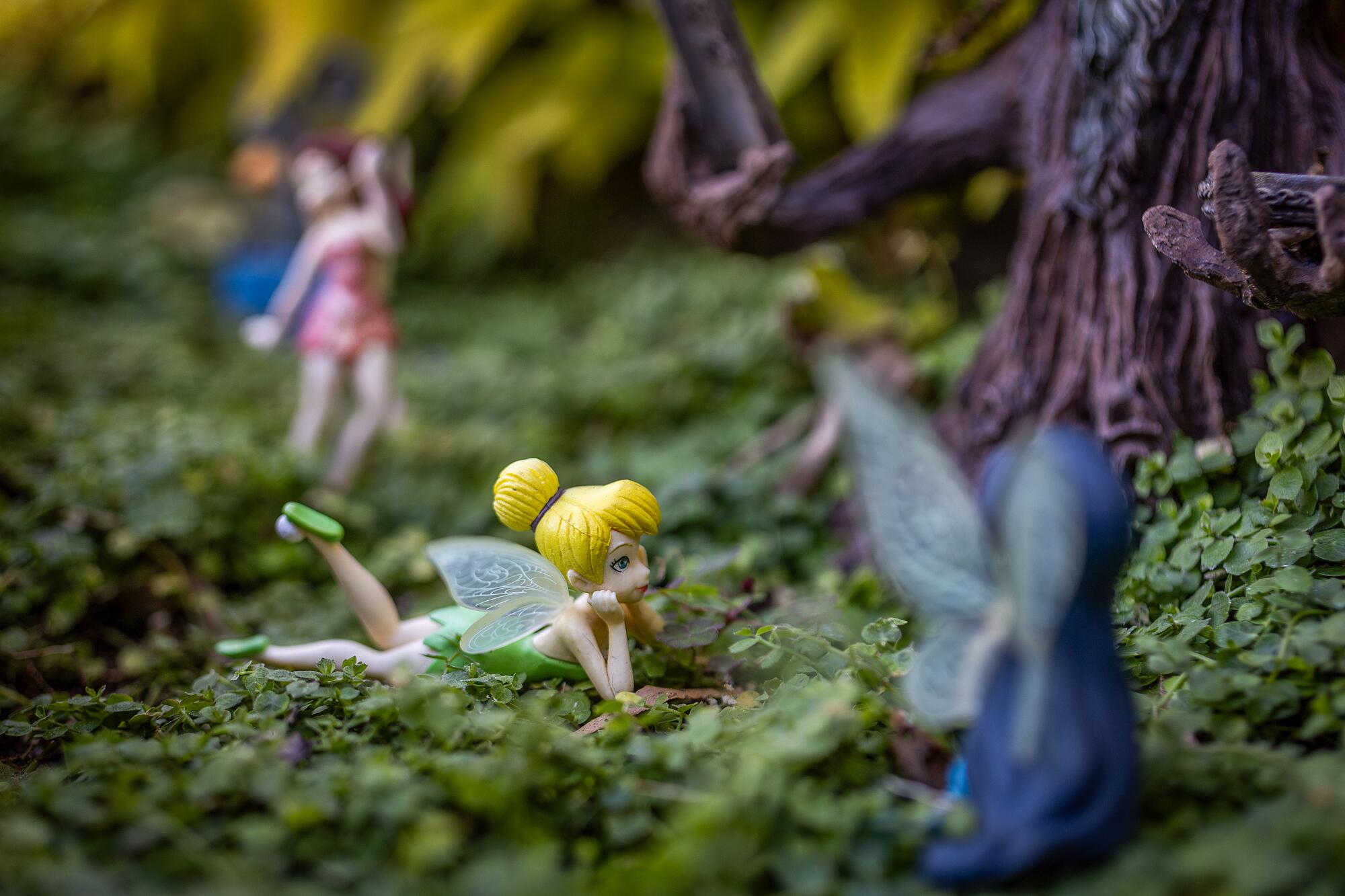
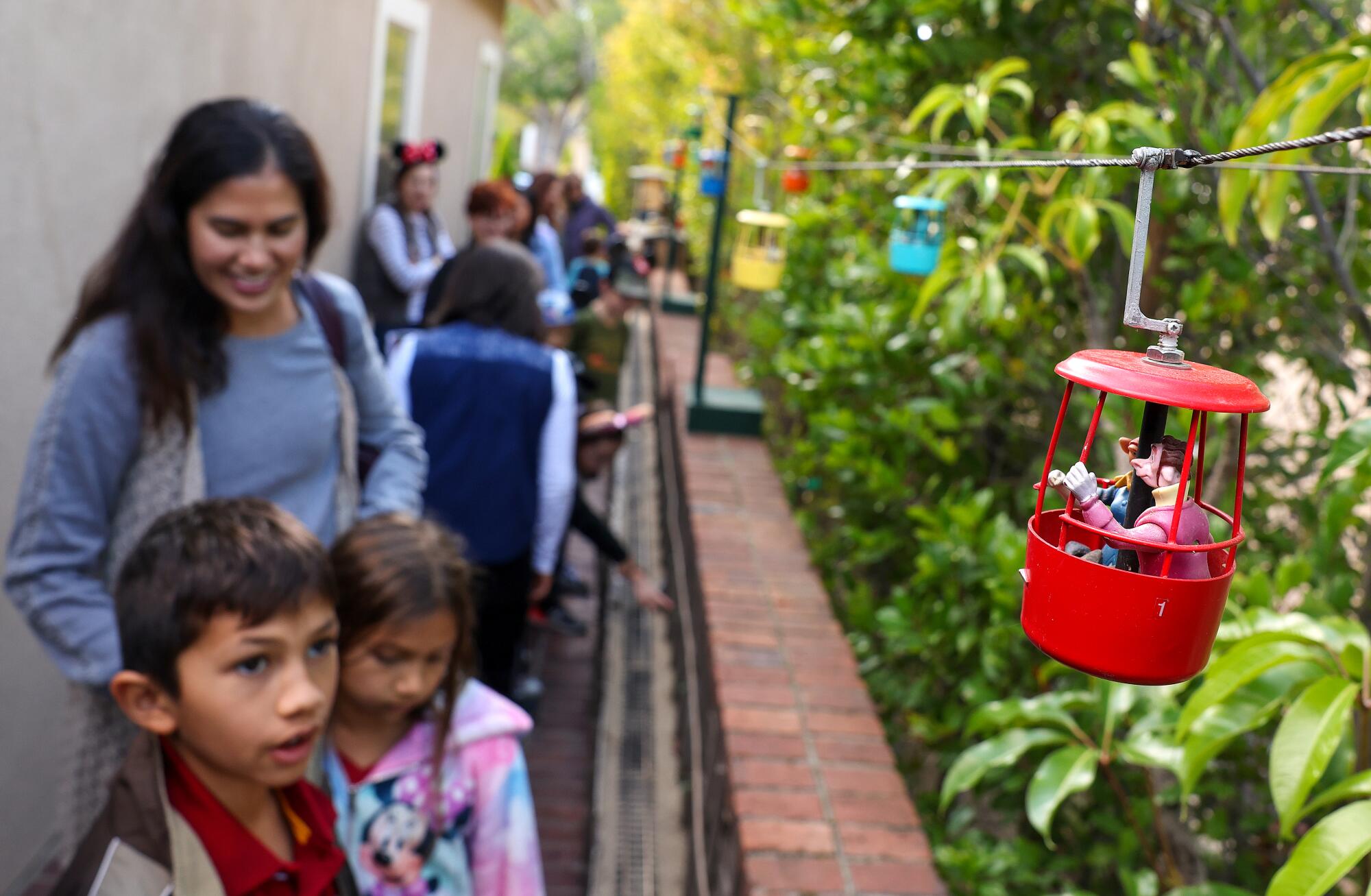
A key appeal of Castle Peak is that it doesn’t try to re-create Disneyland, per se: an equal number of miniatures reference animated films as they do park attractions. For the latter, Sheegog includes some that no longer exist, including the Skyway, a set he purchased from Von Roll Model Ropeways rather than built, as well as some references to Florida’s Walt Disney World.
Nothing feels incongruous. Disneyland, after all, exists as much in our memories and our imaginations as it does at 1313 Disneyland Drive.
Castle Peak and Thunder Railroad
Today, Sheegog is talking about moving the retaining wall on the house to further expand Castle Peak, wanting two new sections, one that nods to Disneyland’s Mine Train Through Nature’s Wonderland, which closed to make way for Big Thunder Mountain, and the aforementioned Galaxy’s Edge expansion. Time and money are hurdles, though, and he’s considered crowd-funding for Castle Peak’s continued development.
And yet that’s another aspect to Castle Peak’s enduring appeal. Like Disneyland, it’s never finished. “It’s like little home additions,” Sheegog says. “But rather than putting on a new bedroom we’re going to do another mountain or another rock feature.”
And it’s all in the name of capturing a little bit of magic.
More to Read
Sign up for The Wild
We’ll help you find the best places to hike, bike and run, as well as the perfect silent spots for meditation and yoga.
You may occasionally receive promotional content from the Los Angeles Times.
